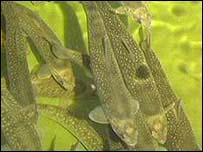|
Scare over farmed salmon safety
BBC News
8th January 2003
The BBC's video report by Tom Heap
"Until now it was thought that the danger was negligible"
Salmon farmed in Scotland is among the most tainted with cancer-causing chemicals, US scientists have warned.
The Indiana University experts urged people to limit the amount of farmed salmon they eat after studying contamination levels across the world.
In the journal Science, they advise no more than two ounces of Scottish farmed salmon should be eaten every month.
The UK Food Standards Agency challenged the study and said the benefits of eating fish outweighed possible risks.
A Scottish salmon industry body says the study is "misleading the public".
It insists that salmon is healthy - and that levels of "contaminants" are within EU, US and UK thresholds.
The American researchers claim that their work is the most comprehensive analysis to date of salmon toxin concentrations, looking at more than two metric tonnes of fish bought in shops in North America, South America and Europe.
Studies have suggested that the high level of essential fatty acids found in salmon makes them a healthy addition to the diet - and the latest research is likely to alarm consumers who eat it regularly as a result.
Salmon farming, in which the fish are bred and fed in pens, is the reason why salmon is plentiful and affordable on supermarket shelves.
Toxin check
The US team examined the levels of 14 toxins; all rated as likely to cause cancer in humans by US authorities, including dioxins and PCBs.
“We think it is important for people who eat salmon to know that farmed salmon have higher levels of toxins than wild salmon from the open ocean” - Professor Ronald Hites, University of Indiana
Farm-raised Atlantic salmon - similar to that found in Scottish farms - was found to have significantly higher levels of 13 toxins compared with wild Pacific salmon.
Farmed salmon are often fed meal produced by grinding up other types of fish, transferring the toxins from these fish directly into the salmon and, over time, accumulating higher levels than would be found in wild salmon which have a different diet.
Tests on this salmon "chow" in each region revealed a correlation between toxin levels here and those in the fish purchased there.
Overall, they said, levels of toxins, were found to be highest in farmed salmon from Scotland and the Faroe Islands.
Guidelines
The researchers said that, using "fish consumption advisory methods" from the US Environmental Protection Agency (EPA), they were able to calculate what they would recommend as a safe level of consumption.
They say that the potential risk to health posed by a variety of toxins found in the same piece of fish may "detract from the beneficial effects of fish consumption".
A single meal - eight ounces uncooked - of farmed salmon from supermarkets in Frankfurt, Edinburgh, Paris, London and Oslo should only be eaten every one or two months, they said.
For salmon farmed in Scotland and the Faroe Islands, they recommended an even smaller monthly limit - just a quarter of a serving, or two ounces.
“In fact, consumers should be reassured by this research, despite its rather obvious attempt to stir anti-fish farming headlines” - Dr John Webster, Scottish Quality Salmon
Professor Ronald Hites, from the University of Indiana School of Public and Environmental Affairs, said: "We think it is important for people who eat salmon to know that farmed salmon have higher levels of toxins than wild salmon from the open ocean."
Industry anger
However, the study has provoked a furious response from the industry body which represents salmon farmers in Scotland.
Scottish Quality Salmon - which represents 65% of production in the country - accused the researchers of being "deliberately misleading" in their interpretation of EPA risk assessment guidelines.
A spokesman said: "In advising how much salmon should be eaten the study ignores all of the health benefits of regular farmed salmon consumption as reported in over 5,000 scientific studies.
"It also, we believe, misuses the risk assessment guidelines provided by the US EPA which are meant to be applied to non-commercially caught fish and should include consideration of health benefits."
Dr John Webster, SQS technical consultant, added: "In fact, consumers should be reassured by this research, despite its rather obvious attempt to stir anti-fish farming headlines.
"It actually says that individual contaminant concentrations in farmed or wild salmon do not exceed US Food and Drug Administration action or tolerance levels."
Levels of PCBs and dioxins are significantly below thresholds set by the EU and Food Standards Agency, insists the body.
Fish meal and fish oils fed to farmed salmon were sourced from areas least affected by contamination, said SQS.
Official backing
In addition, the UK Food Standards Agency agrees that the study does not show levels of individual toxins exceeding internationally recognised safety limits.
The study does not raise any new safety concerns, it says.
Chairman Sir John Krebs said: "Although dioxin levels have decreased dramatically over the past two decades they remain a consumer concern.
"We advise that the known benefits of eating one portion of oily fish outweigh any possible risks."
However, the FSA has commissioned research into the risks and benefits of eating more than this amount.
Top
|
